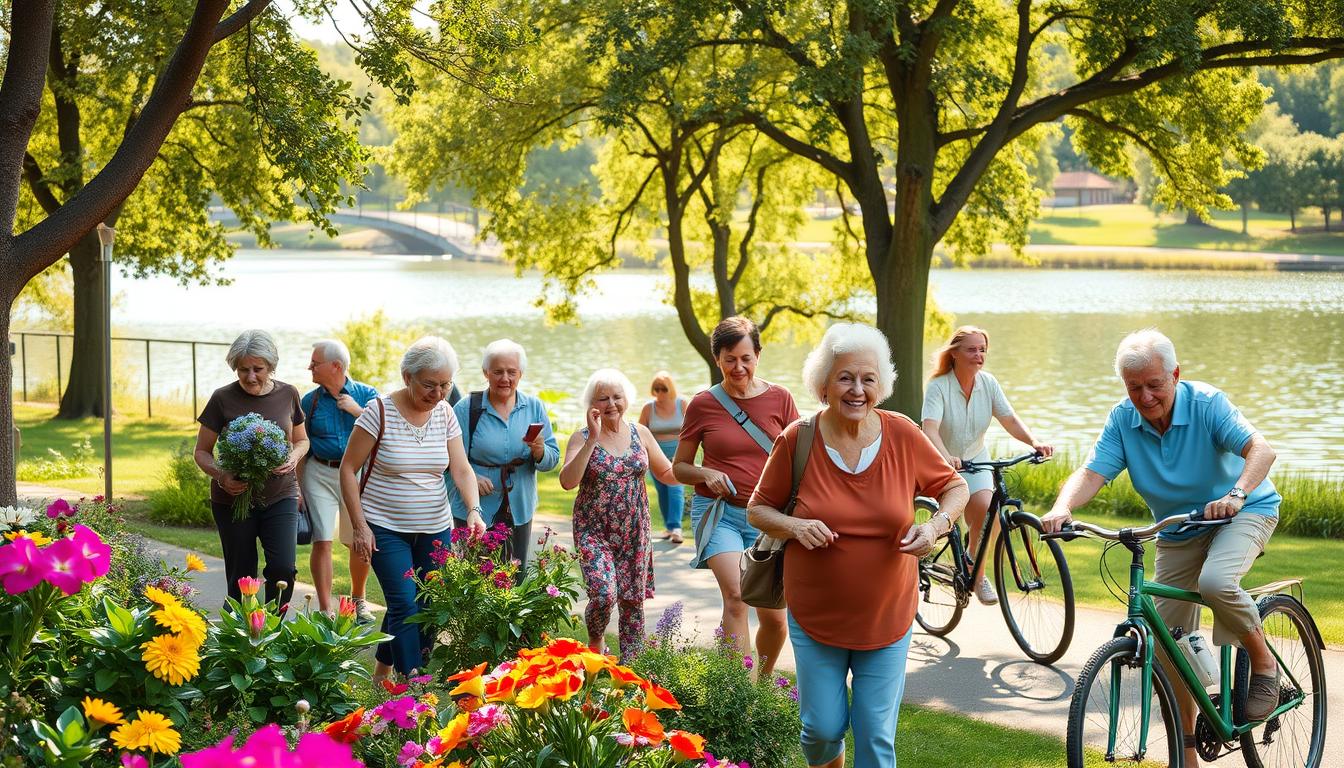Retirement brings a big change, full of excitement and challenges. It’s key to keep an active retirement lifestyle. This guide will show you how to stay lively and engaged in your golden years.
Research shows an active retirement boosts your life quality. A 2023 study found that staying alone can lead to depression in older people. Being active helps fight loneliness and keeps you physically and mentally fit.
Trying new things and hobbies keeps your mind sharp. Many places offer classes for older adults, encouraging learning and socialising. Right at Home, with over 80 offices in the UK, helps older people who feel lonely, showing the value of staying connected.
Key Takeaways
- Regular physical activity is essential for maintaining health in retirement
- Engaging in new hobbies can help prevent cognitive decline
- Social connections are key to fighting loneliness
- Community classes offer chances to learn and meet people
- Setting goals gives direction and motivation in retirement
- An active retirement lifestyle improves overall well-being
Understanding the Importance of an Active Retirement
Embracing an active retirement is key for healthy ageing. Research proves that staying active physically, mentally, and socially boosts your golden years. Let’s dive into the many benefits of active retirement and how it boosts overall well-being.
Physical and Mental Benefits
Regular exercise is essential for keeping strong, flexible, and heart-healthy as we age. Sadly, only one in 10 Australians over 50 exercise enough. Doing 150 minutes of moderate activity a week can help keep weight in check and improve health.
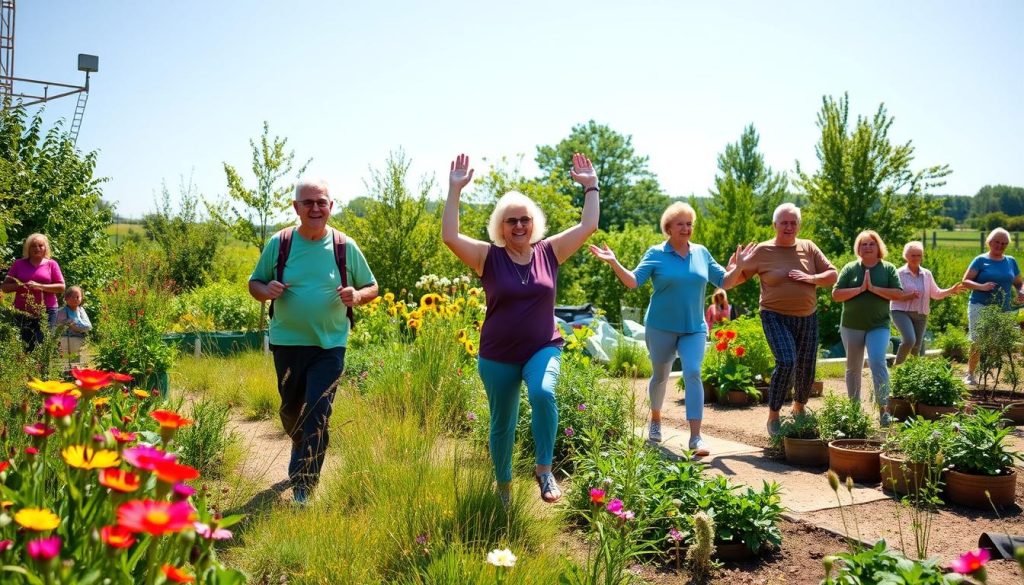
Preventing Age-related Decline
An active lifestyle can prevent age-related decline and lower chronic disease risk. For example, daily gardening can cut dementia risk by 36%. Regular exercise also improves brain function and reduces vascular dementia risk in seniors.
Social and Emotional Advantages
Active retirement brings many social and emotional perks. With one in five older Australians feeling lonely, staying active fights off loneliness and depression. Joining group activities and community events can increase happiness and mental health.
| Activity | Benefit | Recommended Frequency |
|---|---|---|
| Aerobic Exercise | Lowers blood pressure | 30 minutes, 5 times a week |
| Strength Training | Builds bone density | 2-3 times per week |
| Stretching | Improves flexibility | Daily |
Knowing the benefits of active retirement can inspire you to live a more vibrant life. This leads to better physical health, sharper mind, and emotional well-being in retirement.
Creating a Structured Daily Routine

Creating a good retirement routine is key to a happy post-work life. Studies show that those with a daily plan feel less stressed by 45%. This highlights the need for careful planning in retirement.
A good retirement routine includes:
- Regular wake-up time (7 AM recommended)
- Daily physical activity (30-minute walks)
- Engaging in hobbies (3-4 times weekly)
- Social interactions (2-4 events per week)
- Household chores (monthly deep clean, weekly laundry)
- Meal preparation (cooking 4 times weekly)
Following a routine can bring big benefits. Research shows that those with morning routines feel 25% more productive. Also, those who do meaningful activities in the morning are 40% happier.
It’s important to find a balance between routine and freedom in your daily planning. This balance lets you be spontaneous while staying on track. A good retirement routine isn’t about being strict; it’s about setting up a framework that supports your goals and interests.
“A retirement routine isn’t about filling time, it’s about fulfilling purpose.”
By adopting a structured yet flexible daily plan, you can make your retirement years fulfilling and fun. This balanced approach can improve your thinking, sleep, and overall life quality.
Physical Activities for Retirees
Keeping fit in retirement is key to staying healthy and full of life. The NHS says older adults should do at least 150 minutes of moderate activity or 75 minutes of vigorous activity each week. This is the base for a good exercise plan for seniors.
Low-impact Exercise Options
Looking for easier exercises? Low-impact activities are perfect. Walking, water aerobics, and hiking are great for keeping your heart rate up without harming your joints. Even simple tasks like housework or gardening can help keep you fit.
Group Fitness Classes
Group fitness classes can really help you stay motivated and meet new people. Age UK offers special deals on exercise classes for seniors. You can try chair aerobics or dance classes, which are fun and good for you. Being part of a group can also boost your mental health.
Walking and Swimming Programs
Walking and swimming are great for retirees. Starting a walking routine is easy, just take a daily walk around your neighbourhood. Swimming is also excellent, as it works your whole body gently. Both can be tailored to fit your fitness level, making them great for retirement fitness.
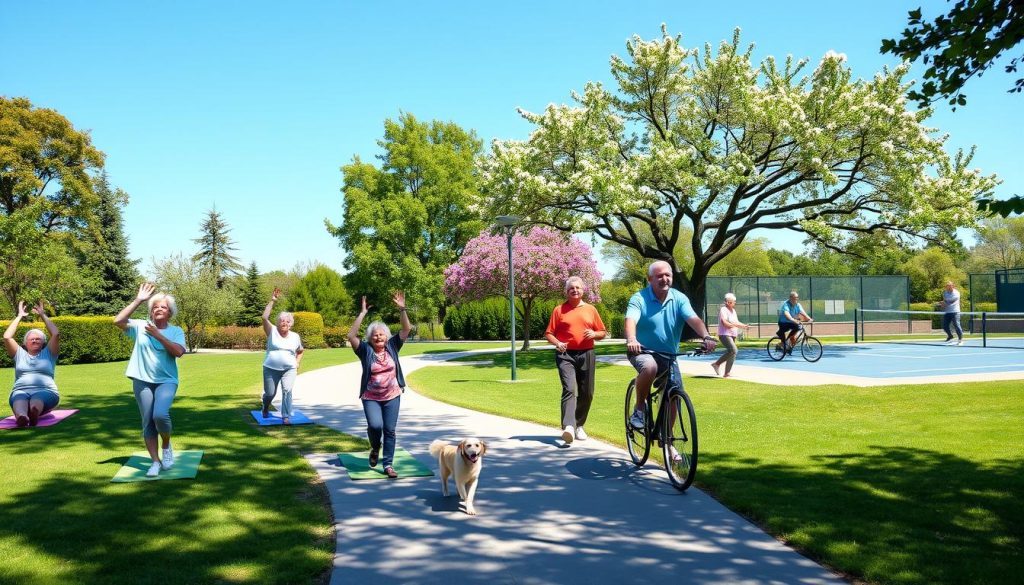
Always start slowly and pay attention to how your body feels. It’s a good idea to talk to a doctor before starting any new exercise routine. With regular effort, these activities can greatly improve your life in retirement.
Stay Active During Retirement
Keeping active in retirement is key for your health. Studies show that exercise can cut depression risk by 30% in older adults. This part talks about setting goals, starting new habits, and staying motivated for an active life.
Setting Achievable Goals
Begin by setting goals that match your interests and skills. Break big goals into smaller steps to avoid feeling too much pressure. For example, if you want to get fitter, start with a 10-minute walk each day and then increase it.
Building New Habits
It’s important to form new habits for an active lifestyle. Start small, stick to it, and keep track of your progress. Gardening, for instance, can boost physical activity by 70% compared to not gardening. Try adding activities like gardening to your routine to create good habits.
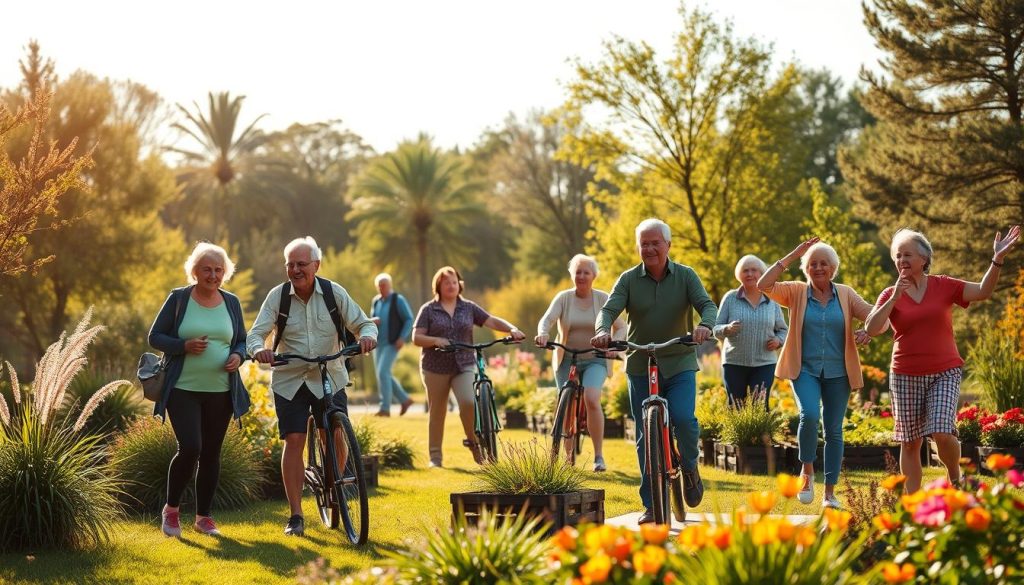
Maintaining Motivation
To keep motivated, pick activities you love. Celebrate your wins and change your goals if needed. Doing creative things like writing or painting can make you 10% happier. Doing something meaningful makes you happier and healthier.
| Activity | Benefit | Percentage Improvement |
|---|---|---|
| Regular physical activity | Reduced risk of depression | 30% |
| Gardening | Increased physical activity levels | 70% |
| Creative pursuits | Improved emotional well-being | 10% |
By using these tips, you’ll be ready to enjoy an active retirement. Remember, being active is not just about physical health. It’s about having a fulfilling and rewarding retirement.
Mental Stimulation and Cognitive Health
Keeping your mind sharp is key in retirement. Doing activities that challenge your brain can stop age-related decline. Studies show that those who keep their minds active tend to stay sharp longer.
There are many ways to boost your brain:
- Reading regularly
- Solving puzzles and crosswords
- Learning a new language
- Playing strategic games
- Taking up a musical instrument
Learning new things is important for your brain. Try classes or workshops to learn new skills. Hobbies like painting, writing, or crafting can also make your mind sharper.
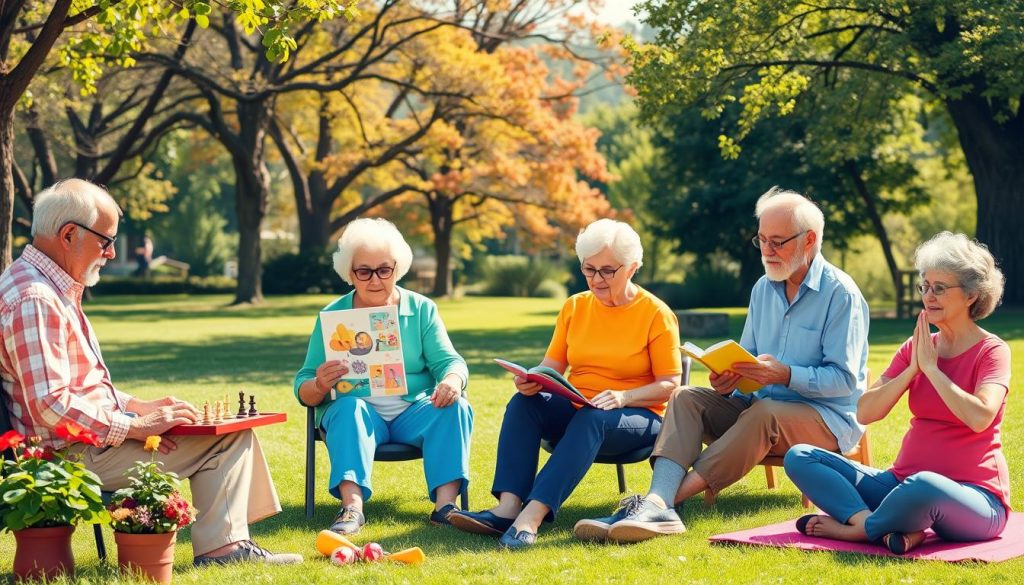
Research shows that learning new skills, like digital photography or quilting, can improve memory. Trying new things might be better than doing the same old tasks.
| Activity | Cognitive Benefit |
|---|---|
| Physical exercise | Increases brain structure size |
| Cognitive training | Slows cognitive decline |
| Mediterranean diet | Lowers dementia risk |
| Social engagement | Enhances overall well-being |
While ‘brain training’ products are popular, their effectiveness is not proven. Instead, choose activities that are fun and mentally stimulating. This will make your retirement years more enjoyable and fulfilling.
Social Engagement and Community Involvement
Retirement socialising is key to a happy life in your golden years. It keeps your mind and body healthy. Being part of your community offers many benefits.
Volunteering Opportunities
Volunteering is a great way to stay active and feel needed. You can help at a food bank or animal shelter. It gives you a sense of purpose.
Studies show that 31% of seniors feel more fulfilled when they volunteer.
Group Activities
Joining clubs or groups helps you meet new people. It keeps you socially active. Research shows it can lower depression by up to 70%.
Many senior living places have five activity groups every day. They encourage everyone to join in.
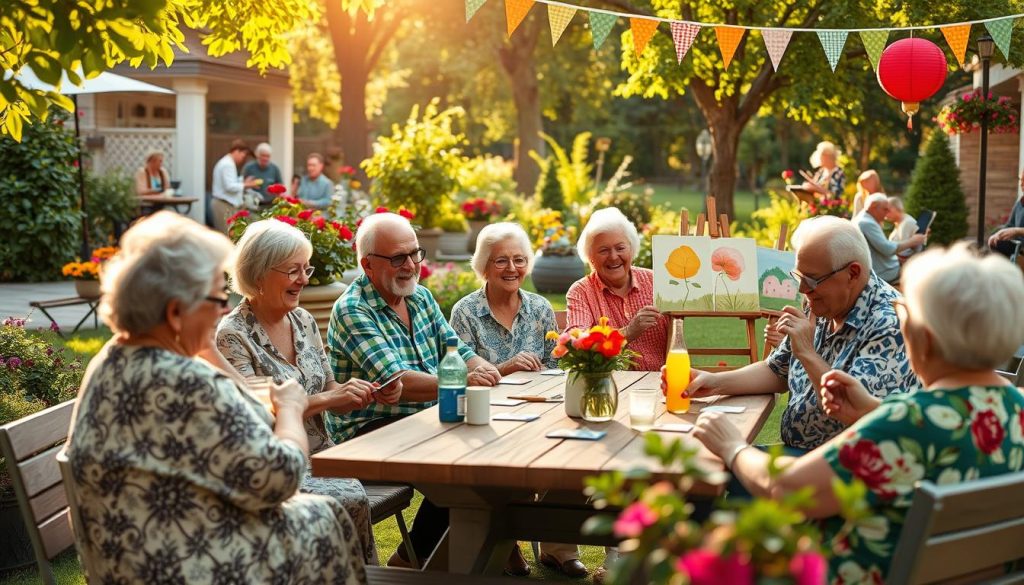
Cultural Events
Going to cultural events is a great way to learn and meet others. You can enjoy art or festivals. It’s a chance to connect with your community.
Studies say attending these events can boost social interaction by 45%. It helps seniors feel more at home.
| Activity | Benefit | Impact |
|---|---|---|
| Volunteering | Sense of purpose | 31% increased fulfilment |
| Group activities | Consistent social interaction | 70% lower risk of depression |
| Cultural events | Community integration | 45% increase in social engagement |
Getting involved in retirement socialising and community activities can make your life better. It keeps you active and helps you make lasting connections. This makes retirement truly fulfilling.
Travel and Exploration in Retirement

Retirement is a chance to start exciting adventures and see the world. Many UK retirees enjoy retirement travel to stay active and make memories. A big number, 65%, plan to travel with their partner, showing the joy of shared experiences.
Spain and Italy are top choices for seniors, with 46% and 41% preferring these places. Greece and the USA are also favourites, more so among younger retirees. Cruise holidays are becoming more popular, with 26% of those over 75 having tried one.
Planning your finances is key for travel in retirement. While 62% save for trips, 21% haven’t saved anything. The Retirement Living Standards say you need £43,100 for a ‘moderate’ retirement, including travel costs.
Travel isn’t just about relaxation; it’s an avenue for exploration and lifelong learning.
When picking places to visit, 61% of retirees look at cost first. Sunny weather and affordable places to stay are also important. Interestingly, 84% feel confident about travelling in retirement, with men more likely to go solo than women.
Retirement travel does more than just entertain. It boosts your brain, social skills, and fights loneliness. Many say it greatly improves their life quality, making it a great choice for the golden years.
Nutrition and Healthy Eating Habits
As we get older, our diet needs change. Senior nutrition is key to staying healthy and full of energy in retirement. A balanced diet helps keep bones strong, the mind sharp, and overall health good.
Balanced Diet Tips
Healthy eating for seniors means getting a variety of nutrients. Eat 7 servings of fruits and veggies every day. Choose low-fat dairy for 3 servings to keep calcium levels up.
For protein, women should have 2 servings of meat or alternatives. Men need 3 servings. This helps keep muscles strong.
| Nutrient | Daily Recommendation |
|---|---|
| Calcium | 1,200 milligrams |
| Vitamin D | 2000 IU |
| Vitamin B12 | 2.4 micrograms |
| Fiber (Women) | 21 grams |
| Fiber (Men) | 30 grams |
Meal Planning
Good meal planning is essential for a balanced diet. Try eating smaller, more frequent meals. This can be easier for older adults.
Include healthy snacks to keep energy up all day. Limit sugar to no more than 30g, about seven sugar cubes.
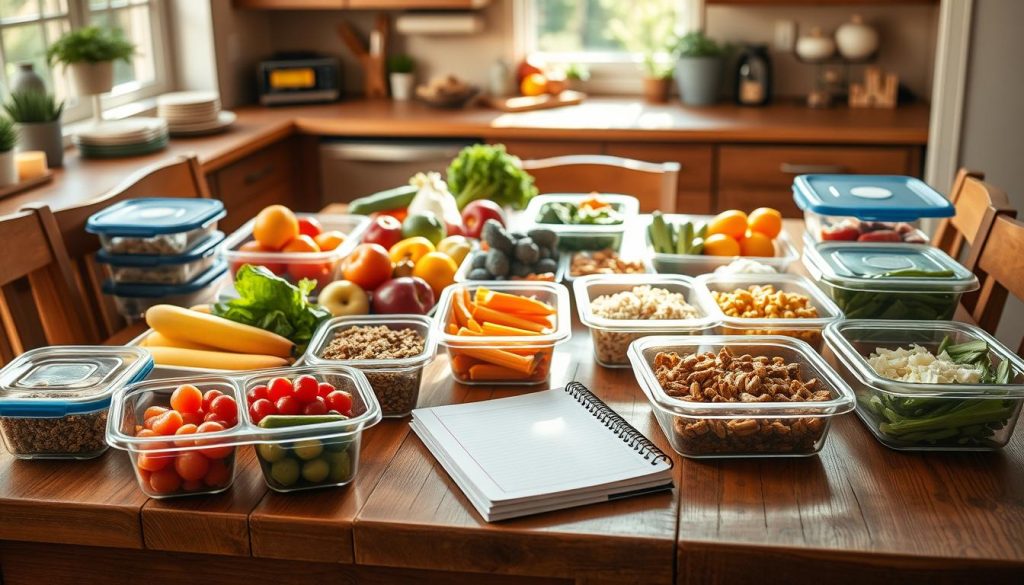
Dietary Requirements for Seniors
Drink six to eight glasses of water a day to stay hydrated. Keep salt intake below 6g for heart health. Adjust your food intake if you’re less active.
About 25% of seniors don’t get enough nutrients. Staying at a healthy weight is important for mobility and reducing heart disease and diabetes risks.
A balanced diet is associated with increased energy, reduced risk of heart disease, better weight control, and prevention of type 2 diabetes.
By following these senior nutrition guidelines and healthy eating habits, you can enjoy a more active and fulfilling retirement.
Hobbies and Creative Pursuits
Retirement brings a chance to explore new hobbies and creative activities. With more free time, you can pursue interests you may have put off while working.
Gardening is a favourite among retirees. It’s gentle exercise and lets you grow something beautiful. It also boosts vitamin D from the sun.
Painting and drawing are great for relaxation and stress relief. They help manage stress well.
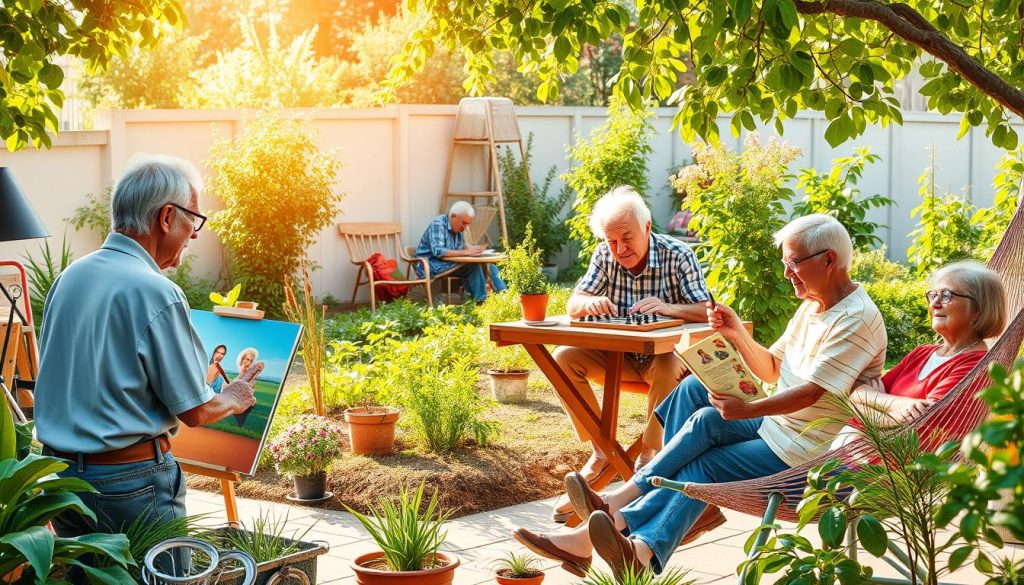
Learning a new language can keep your mind sharp. It improves communication skills. Writing workshops boost creativity and personal satisfaction.
Book clubs are good for mental stimulation. They help keep your mind active.
Music lovers might want to learn an instrument. It’s good for memory and coordination. Plus, playing music with others is therapeutic.
About 68% of retirees want to try new hobbies. This shows how important these activities are.
Doing social hobbies can fight loneliness. Studies show that those who join activities weekly feel more connected. Clubs and volunteering give a sense of purpose and happiness.
Retirement is your time to explore and enjoy. Try new things and find what you love.
Technology and Digital Skills
Using technology in retirement can really improve your life. A huge 75% of older adults think tech can make their retirement better. Learning senior tech skills opens up new chances for learning, making friends, and making life easier.
Online Learning Platforms
The digital world is full of chances to keep learning. Many retirees enjoy taking online courses on different topics. These sites let you learn from home, keeping your mind active and interested.
Social Media Connection
Social media is great for staying in touch with family and friends. In fact, 60% of retirees say they feel closer to their loved ones after using it. It’s a good way to share news, see photos, and keep up with each other, even when you’re far apart.

Digital Safety
But, it’s important to stay safe online. 57% of older adults worry about online safety. Learning how to make strong passwords, spot scams, and protect your personal info is key to staying safe online.
By getting into technology and improving your digital skills, you can make your retirement better. You can manage money online, get health care through telemedicine, and more. Remember, 80% of seniors say learning new tech makes them feel more independent and involved in their daily lives. So, dive into the digital world and enjoy the benefits in your golden years.
Pet Companionship Benefits
Pets for seniors bring many benefits, making them a great choice for retirees. Studies show that owning a pet can greatly improve life quality. 70% of retirees say caring for pets gives them a new sense of purpose.

Pet ownership has amazing health benefits. Pet owners see a 30% drop in stress-related health issues. They also have a 40% lower risk of heart disease. Plus, they tend to be more active, doing 30% more physical activity than those without pets.
Pets can fight loneliness and depression. Seniors with pets have a 15% lower chance of clinical depression. About 60% of pet owners say their pets helped them make new friends. This is great for retirees who might feel lonely.
“My dog, Charlie, has been a lifeline for me after I retired. He gets me out of the house, introduces me to new people, and makes me smile every day.” – Margaret, 68
When picking a pet, choose one that suits your lifestyle and abilities. Dogs need more energy and care, while cats are more independent. But, the bond with a pet can bring endless joy and companionship to your retirement.
Home Safety and Organisation
Keeping your home safe and organised is key to staying independent in retirement. As we get older, accidents at home can be more serious. So, making your home safe is very important.
To stop falls, put nonslip mats in your bathroom and fix any frayed rugs. Make sure your home is well-lit and keep loose cords out of the way.
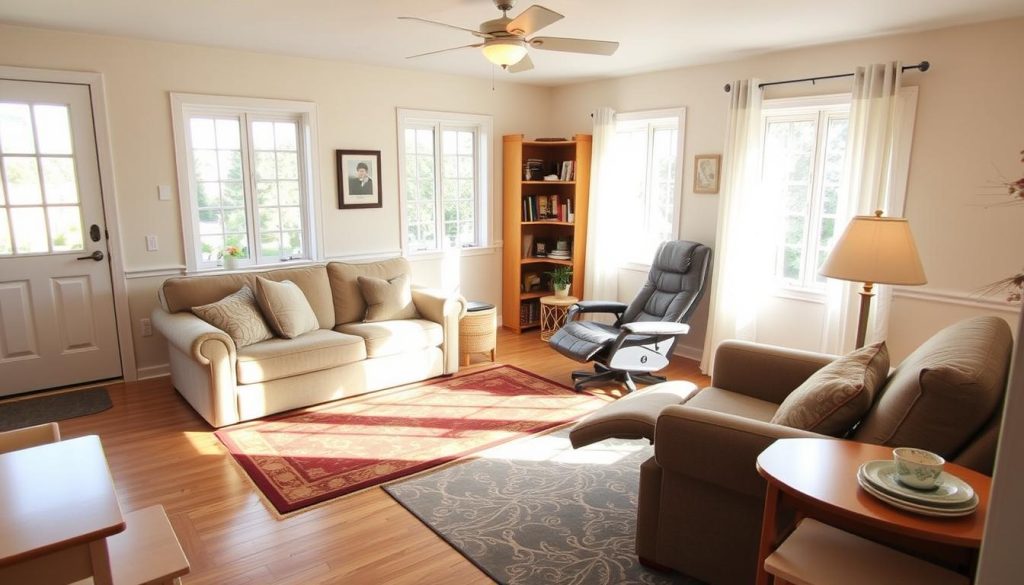
- Install handrails on both sides of the staircase
- Apply anti-skid strips on each step
- Ensure proper lighting in stairwells
Being well-organised in retirement can make your life easier. Clear out clutter and use smart storage to keep things you need close. Think about getting smart home tech for more safety and ease.
A tidy home means a tidy mind. Organising your space can make your retirement more enjoyable. For more tips on staying active in retirement, check out our membership registration page.
“A tidy home is a tidy mind. Organising your living space can lead to a more fulfilling retirement.”
Focus on making your home safe and organised for a happy retirement. You’ll feel more confident and at peace.
Financial Wellness in Retirement
Managing your money in retirement is key to a happy life. Smart budgeting and finding cheap fun can make your savings last longer. Let’s look at some ways to keep your finances in check while enjoying your retirement.
Budgeting for Activities
Creating a budget is essential for a healthy retirement. The 4% rule might not work for everyone. It’s smart to review your budget often, thinking about inflation and healthcare costs.
Many retirees don’t plan for healthcare costs well. Over 70% are unsure if they can cover these expenses.
Cost-effective Entertainment
Finding cheap ways to have fun is important. Look for senior discounts, join community groups, or find free events. Volunteering is also a great way to meet people and feel good without spending money.
25% of retirees feel less happy because of money worries. So, it’s important to enjoy life while being careful with money.
Don’t forget about Health Savings Accounts (HSAs) for healthcare costs. With their tax benefits and 2023 limits, HSAs can help your retirement finances. By managing your money well and finding cheap activities, you can enjoy retirement without worrying about money.
